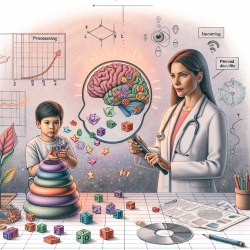Introduction
Developmental Phonological Disorder (DPD) presents unique challenges in the perception, production, and representation of speech sounds. As speech-language pathologists (SLPs), understanding the nuances of DPD is crucial for effective intervention. A recent study, "Listening and Processing Skills in Young School Children with a History of Developmental Phonological Disorder," provides valuable insights into the listening and processing skills of children with DPD, compared to their typically developing (TD) peers.
Understanding the Research
The study utilized the Evaluation of Children’s Listening and Processing Skills (ECLiPS) to assess 115 children with DPD and 46 TD children, aged 7 to 10. The findings revealed that while the mean ECLiPS scores were similar between groups, children with DPD exhibited more significant difficulties in speech and auditory processing, environmental and auditory sensitivity, and pragmatic and social skills. Notably, 33.9% of children with DPD had clinically significant difficulties in two or more subscales, compared to 10.9% of TD children.
Implications for Practitioners
For practitioners, these findings underscore the importance of comprehensive assessments that go beyond surface-level speech sound errors. The ECLiPS tool can help identify broader listening and processing difficulties, guiding targeted interventions. Here are some practical steps SLPs can take:
- Utilize Comprehensive Tools: Incorporate tools like ECLiPS to assess a wide range of auditory and cognitive skills, ensuring a holistic understanding of each child's needs.
- Focus on Pragmatic Skills: Given the challenges in pragmatic and social skills, interventions should include social communication strategies to enhance peer interactions.
- Address Environmental Sensitivity: Implement strategies to help children manage auditory sensitivity, such as controlled exposure to varying sound environments.
- Encourage Parental Involvement: Educate parents on the importance of consistent support at home, using structured activities that reinforce therapy goals.
Encouraging Further Research
The study highlights the need for further research into the long-term outcomes of children with DPD. Practitioners are encouraged to contribute to this body of knowledge by documenting and sharing their clinical experiences and outcomes. Collaborative research efforts can lead to more refined assessment tools and intervention strategies, ultimately improving outcomes for children with DPD.
Conclusion
The insights from this study offer a data-driven foundation for enhancing speech-language pathology practices. By adopting comprehensive assessment tools and targeted interventions, practitioners can significantly improve the listening and processing skills of children with DPD, fostering better communication outcomes.
To read the original research paper, please follow this link: Listening and Processing Skills in Young School Children with a History of Developmental Phonological Disorder.










